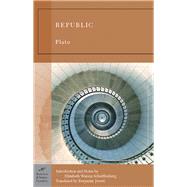From Elizabeth Watson Scharffenberger’s Introduction to Republic
The conversation in Republic begins simply enough. Socrates, who has plainly been on familiar terms with Polemarchus’ family for a long time, forthrightly asks Cephalus about old age. His response, that aging is not as difficult as it is often reported to be, prompts Socrates to wonder out loud whether Cephalus’ easygoing attitude is in part facilitated by his wealth. The old man’s response is affirmative. The wealthy, he asserts, face death without fear; their resources enable them to satisfy their debts to gods and men and also to avoid lying and cheating, and thus they can die with the confidence that they will not be punished in the afterlife. These remarks are what precipitate the discussion of just behavior and moral conduct, which Socrates introduces as he asks his elderly friend whether “justice” (dikaiosynê) simply consists of paying debts and telling the truth. Cephalus politely bows out of the conversation, leaving his son Polemarchus to argue that justice—meaning “right behavior” in general—does indeed consist of paying debts and giving “what is due,” as poets such as Simonides claim. Socrates, however, quickly leads Polemarchus to realize that there are serious logical problems with this traditional conception of justice, in which “what is due” is defined in terms of “help” to “friends” and “harm” to “enemies,” and the young man is left perplexed.
At this point, Thrasymachus leaps into the discussion, asserting that justice is simply “the advantage of the stronger,” by which he clearly means that “justice” is relative—that is, “right behavior” is whatever those in power determine it to be. With a series of questions that recall those he just posed to Polemarchus, Socrates uncovers logical problems in Thrasymachus’ definition as well. Thrasymachus, however, does not give up. Exploding in frustration at Socrates’ naive assumptions about the responsibilities that the powerful bear to those who are under their control, he reformulates his ideas with a bold new emphasis evocative of Antiphon’s thinking in “On Truth.” “Justice”—that is, the circumspect avoidance of doing “wrong” to others and obedience to social rules—is doing what is advantageous to another, who is stronger and more powerful than oneself. “Injustice,” on the other hand, is doing what is to one’s own advantage by taking what one wants regardless of social rules and by aggrandizing oneself at the expense of others. It is what leads to “happiness,” provided that one is not penalized for one’s exploitations. Tyrants who kill and confiscate and rape at will, according to Thrasymachus, are the happiest men of all.
Although Socrates is able to poke holes through the logic of this new formulation with questions that hark back once again to those he has already posed, Thrasymachus’ sulky concessions leave him unconvinced that he has made an effective case for the connection between justice, which through all has not been adequately defined, and “happiness.” Nor are Glaucon and Adeimantus convinced, and it is their persistence at the beginning of book 2 that launches the more systematic and extensive inquiry into the nature of justice and its relationship to happiness that occupies the rest of Republic. In particular, the brothers ask Socrates to explain how justice is in itself the source of happiness, regardless of whether it is recognized and rewarded, and how the just man can be happy, regardless of his material circumstances.
The challenges of defining justice and understanding its effects on long-term happiness, fulfillment, and well-being—all of which are conveyed by the Greek word eudaimonia—lead to the discussion of the ideal city-state, which is posited as a large-scale vehicle for apprehending the operations of justice in the individual. Socrates, Glaucon, and Adeimantus spend a good deal of time and energy discussing how the ideal state will be organized, and how its classes of warriors and leaders will be selected, educated, and provided for; they are especially concerned in books 2 and 3 with the training and acculturation of guardian children, whose exposure to poetry (Iliad and Odyssey in particular) is to be severely curtailed lest they learn harmful values and patterns of behavior.
Yet the three never lose sight of the goals of their examination. By the end of book 4, they arrive at a working (and, in several regards, striking) definition of justice as the condition, or state of being, in which each person in the community—and each element of the individual human soul (psyche)—minds his/her/its own business and does his/her/its own “work.” Since it has been determined that there is in the human soul, as in human society, a natural ruling element, justice is thus equated with the unencumbered rule of these elements: the “gold” class of guardians in the ideal state, which holds sway over the silver and bronze/iron classes, and, in the individual, the rational part of the soul that ought to be master of both “spirit” and appetites.
